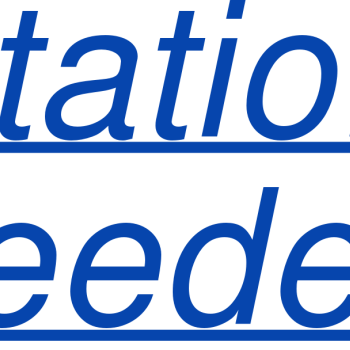Let the students be the vocabulary experts! Prior to whole class instruction, students create online flashcards and teach the class the new vocabulary.

Picture This: Student Created Online Vocabulary Flashcards

Grades
|
Chasing the Dream: Researching the Meaning of the American Dream
9 - 12
Lesson Plan
| Standard Lesson
By conducting interviews, sharing and assessing data, and writing papers based on their authentic research, students reach their own conclusions on the meaning of the American Dream.

Grades
|
Story Writing from an Object's Perspective
4 - 7
Lesson Plan
| Standard Lesson
Students explore writing from non-human perspectives through a picture book read aloud, mini-lesson, collaborative writing, and the writing process. Students create "A Day in the Life of…" story about an inanimate object.

Grades
|
Book Report Alternative: Creating Reading Excitement with Book Trailers
4 - 12
Lesson Plan
| Standard Lesson
In this alternative to the traditional book report, students create book trailers using Microsoft Photo Story 3, a free downloadable software program for digital storytelling.

Grades
|
Talking Poetry with Blabberize
4 - 8
Lesson Plan
| Standard Lesson
Students will be motivated to share their poetry through an online tool the features recording and animation.

Grades
|
Book Report Alternative: Rewind the Plot!
6 - 12
Lesson Plan
| Standard Lesson
In this alternative to the traditional book report, students report on their novel choices by rewinding the plot.

Grades
|
Prove It!: A Citation Scavenger Hunt
6 - 12
Lesson Plan
| Minilesson
Students are challenged to find citations that support details about the characters, plot, or themes from a text.

Grades
|
Blending the Past with Today's Technology: Using Prezi to Prepare for Historical Fiction
6 - 10
Lesson Plan
| Standard Lesson
To prepare for literature circles featuring historical novels, students research the decades of the 1930s to the 1990s and share their information using Prezi, a web application for creating multimedia presentations.

Grades
|
Vote for Me! Making Presidential Commercials Using Avatars
6 - 12
Lesson Plan
| Standard Lesson
After researching political platforms of past presidents through primary sources and other resources, students create commercials for these presidents using Voki, an online web tool that produces speaking avatars.

Grades
|
Book Report Alternative: Getting Acquainted with Farcebook
7 - 12
Lesson Plan
| Standard Lesson
In this alternative to the traditional book report, students report on their novel choices using Facebook-like pages.

Grades
|
Animate that Haiku!
5 - 8
Lesson Plan
| Standard Lesson
Following the traditional form of the haiku, students publish their own haikus using Animoto, an online web tool to produce slideshows that blend text and music.

Grades
|
Defining Moments: Charting Character Evolution in Lord of the Flies
9 - 12
Lesson Plan
| Standard Lesson
Savagery, treachery, lost innocence... Lord of the Flies is rife with character development. Use this lesson to help students chart the character changes of Ralph and Jack, both in groups and individually.

Grades
|
What Did George Post Today? Learning About People of the American Revolution Through Facebook
6 - 12
Lesson Plan
| Standard Lesson
After researching famous people of the American Revolution, students create Facebook-like PowerPoint presentations to share their knowledge with classmates.

Grades
|
From Text to Film: Exploring Classic Literature Adaptations
8 - 12
Lesson Plan
| Standard Lesson
Students create storyboards to compare and contrast a book and its film adaptation.

Grades
|
"Licensed" to Drive: Old West Figures
6 - 10
Lesson Plan
| Standard Lesson
This lesson invites students to create a "Driver's License" for characters that have made a contribution to western expansion in the United States.

Grades
|
Breaking the Rules with Sentence Fragments
9 - 12
Lesson Plan
| Standard Lesson
Though teachers usually caution students against using sentence fragments, Edgar Schuster's work demonstrates that professional writers often use fragments effectively. This lesson helps students understand that there are reasons that they can and should use sentence fragments to become effective writers.

Grades
|
Life is Beautiful: Teaching the Holocaust through Film with Complementary Texts
10 - 12
Lesson Plan
| Standard Lesson
After students have read a book about the Holocaust, such as The Diary of Anne Frank or Night by Elie Wiesel, students will view Life is Beautiful and complete discussion questions to challenge their ability to analyze literature using film.

Grades
|
A Tale of a Few Text Messages: A Character Study of A Tale of Two Cities
9 - 12
Lesson Plan
| Standard Lesson
Students use A Tale of Two Cities to explore relationships, plot points, character traits, and background by writing text messages between characters within the novel.

Grades
|
Glogging About Natural Disasters
5 - 8
Lesson Plan
| Standard Lesson
After researching various natural disasters, students share their findings with each other using glogs, or through poster presentations.

Grades
|
Experiencing Haiku Through Mindfulness, Movement & Music
5 - 8
Lesson Plan
| Unit
By being present and mindful on nature walks, students write haiku using vivid sensory language; and explore body movement, music and art as visual and kinesthetic representations of their poetry.